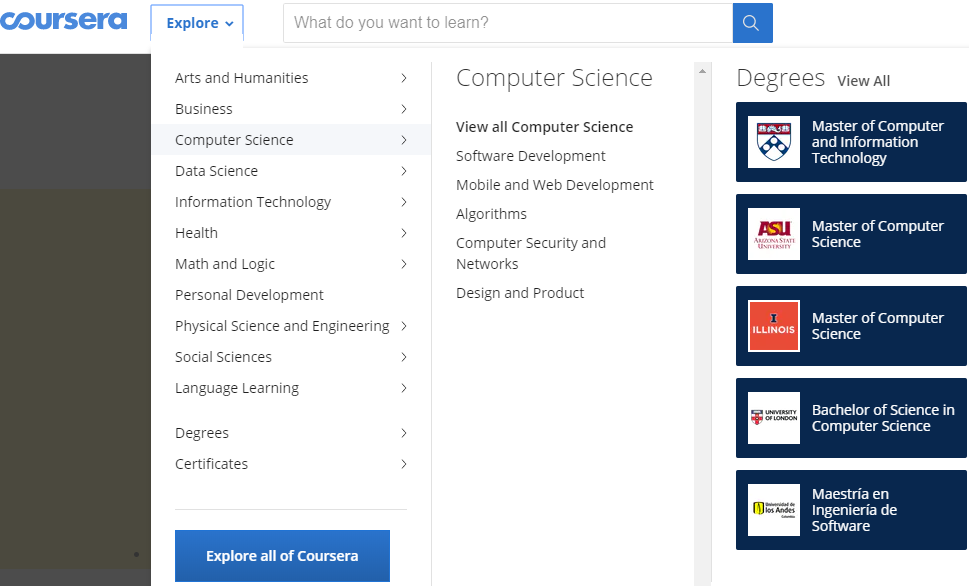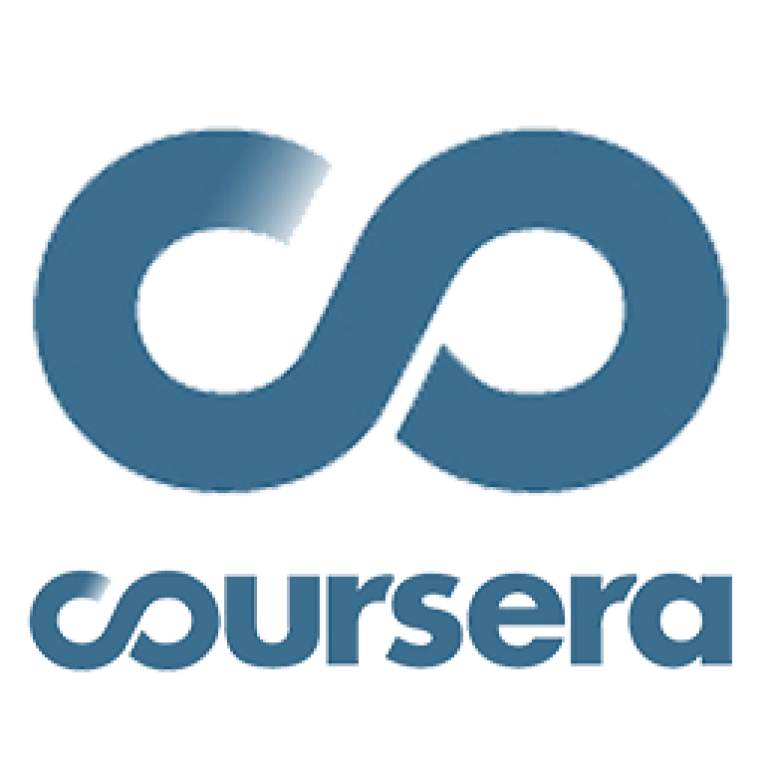The layout is simple, attractive and mobile like. While it is not the most complex in term of
information that it holds, it actually acts as an advantage since it is not too bulky to comprehend
thus the user is more likely to scroll along (as it is the home page after all).
Additionally, the
card-like interface it displays has a similar pattern and color scheme for eye candy. The user
navigates the said cards by scrolling up and down as well as pressing right and left arrows to
reveal new cards containing different information.
The simplicity can be admired with only the
category name such as trending courses and top-rated courses being accompanied with cards each
representing a course.
Content
Coursera, popularly known as a Massive Open Online Courses (MOOC) is a notable and useful website founded in 2012 by Stanford University professors. This American online learning platform offers over 3,800 online courses with a wide variety of categories such as Computer Science, Math and Logic, Health, Social Science and Language learning. Those are provided via MasterTracks or Professional certificates as well as masters and degree courses. Coursera proposes several features to enhance their courses such as:
Pre-recorded video lectures (on demand).
Student discussion forums that incorporate peer-graded assignments.
Homework/Assignment.
Online quizzes and exams.
Generally speaking, Coursera courses are free to audit (eg watch videos) with over 1150+
courses that include assessment for free although other courses assessments are behind a paywall.
All in all, Coursera is a remarkable website to study and earn status as shown by their student
testimonials.
(Shah, 2020)
Navigation

As mentioned above Coursera offers an enormous about of courses. Therefore, the navigation can be tricky. To circumvent the latter and be user-friendly, they implemented a hover-to-open button that displays the different categories of expertise followed by their currently most popular and trending courses as well as what degree or masters is available for each. For further and deeper navigation towards the other courses they included a “Explore all of Coursera” or simply a basic yet handy, search bar if you know what you are looking for.
Layout
Home/Main page layout:
Course page layout:
While there was somewhat a lack of information in the Home/Main page layout we can see that the course page layout is very informative. It has everything you need to know about the course and more!
The above video speaks for itself but in summary you start with the course details such as the course name, rating, price if any and the university that offers it. Moving on you get the details on the course such as what you will learn/achieve with other key notes on the right side.
The instructor also has a rating (4.86/5 in this scenario) which is neat and you also obtain testimonial from previous students as well as relating or continuing/prerequisite courses. It also includes a detailed syllabus on what you will do each week and a FAQ section if there is any doubt.
Behaviour
One behavior that the Coursera website has is that the layout is customized accordingly in relation to your account characteristic such as being a student/software developer or your position in the industry.
In addition to that it also customizes the interface in regards to recent or past searches to better aim their content at the user.
Moreover, it has small behaviors such as button changing color and button opening when hovering over them with the mouse pointer and finally animations behavior in the FAQ section that can be found in a course page.
Web technologies
HTML table:
Web Technology |
Short Description |
|---|---|
Client and server sided JavaScript |
JavaScript is a lightweight, object-oriented, cross-platform scripting language, often used within web pages. |
External, Embedded and Inline CSS |
Embedded Cascading Style Sheets define a set of style rules in a "style" element within a web page. |
HTML5 Markup Language |
HTML5 is the fifth revision of the HTML standard. |
UTF-8 Character Encoding |
UTF-8 (8-bit Unicode Transformation Format) is a variable-length character encoding for Unicode, which is backwards compatible with ASCII. |
Image File Formats |
PNG (Portable Network Graphics) a lossless compression image format |
Structured Data Formats |
Microdata is a specification to integrate metadata within existing content on web pages. |
Cookies expiring days/month remaining |
Persistent cookies with an expiration time between 1 day and 1 month or 1 month and 1 year. |
Default protocol https |
The websites redirects visitors to use SSL encryption, e.g. from http://example.com/ to https://example.com/. |
(W3Techs, 2020)
Overall functionality
The overall functionality of the website is remarkable. To simply put, it does what needs to be done. For example, the search bar shows auto-complete suggestion/results; the hover-to-open button as mentioned above works flawlessly; Login methods includes Facebook and Apple login as well as traditional Email/Password login; Click to expand FAQ buttons opens smoothly with an animation; Works well on mobile while it also has its mobile app for further convenient.
User experience
The user experience as a student is amazing with all the contents and features such as peer-graded assignments. The simplistic and easy to navigate interface and eye candy touch in the design. Facebook and Apple login methods to quickly gain access to the website and therefore its content such as the student forums or video lectures. The functionality working flawlessly such as the buying portal and submitting and assignment. To conclude, in itself, the fact that you can achieve a degree or even a master status through Coursera is incredible.

